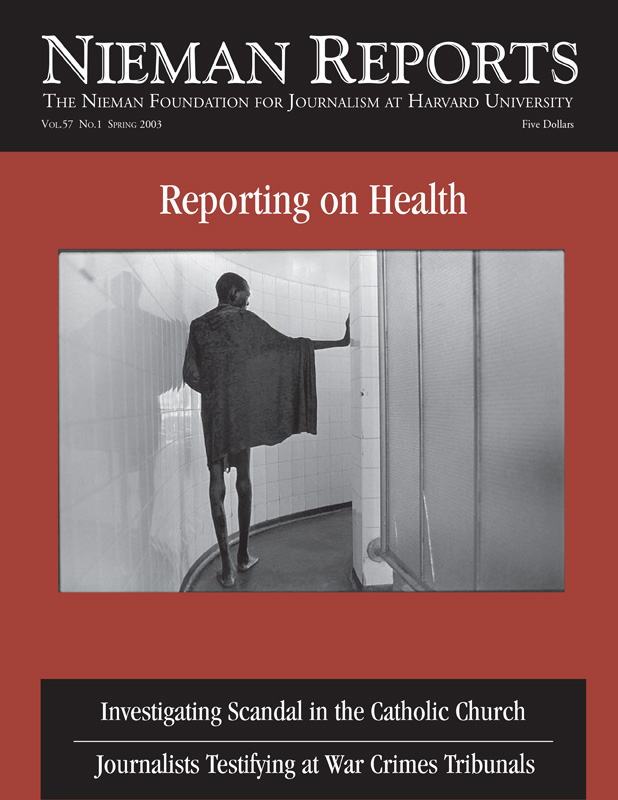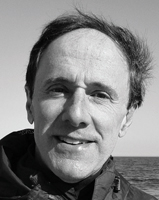It is one week, with one mission: to ignite medical and health reporters with a passion for their beat and equip them with the tools and information to cover it. It is not the Nieman or the Knight but a novel fellowship, a short-form course that can make a huge difference. Most of all it is fun.
We go to hospital emergency rooms at midnight and government emergency bunkers just after dawn. We talk to old men who sleep in trees about living with mental illness and without a home and to fast-food workers about managing with no medical insurance. We’ve eaten cheese sandwiches and talked health politics with a soon-to-be presidential candidate, drank beer and debated medical ethics with the former editor of The New England Journal of Medicine, and discussed various dilemmas facing doctors with the head of the Massachusetts Medical Society.
It is called the Health Coverage Fellowship, and it’s open to medical and health reporters from across Massachusetts.
The Health Coverage Fellowship
Professional development courses are critical for journalists no matter their assignment. But this is especially so on the health beat, where the issues are particularly complex and perpetually evolving. With that in mind the Blue Cross Blue Shield of Massachusetts Foundation last year set up the Health Coverage Fellowship to address the difficulties journalists—particularly at small news organizations—have navigating today’s health care maze.
The fellowship runs each spring at a residential conference center near Boston, for eight days and nights, and continues with half-day programs and mentoring. It involves 10 reporters and editors from Massachusetts newspapers, radio stations and television outlets, selected by a panel of prominent journalists based on past performance and potential. Now entering its second year, the fellowship might eventually expand to accept applicants from across New England and beyond.
The program’s fundamental objective is to familiarize fellows with major issues in health care and medicine in Massachusetts. They are pushed to ask the right questions and shown where to look for answers. They learn to recognize which issues require daily reporting and which warrant more indepth work. They compare notes and talk about how they attack comparable challenges. And when they head back to work, they keep in touch via a listserv and Web site.
Learning Outside the Newsroom
RELATED ARTICLE
“Alcoholism: Its Origins, Consequences and Costs”
– Eric NewhouseEight days isn’t much time to accomplish the program’s ambitious goals, but having great speakers helps. There were 55 of them last spring, from Howard Dean, the doctor-governorpresidential aspirant from Vermont, to journalist Eric Newhouse from the Great Falls (Mont.) Tribune, whose 12-part series on alcoholism proved you don’t have to be from a big paper (his has a circulation of about 40,000) to win a big prize—the Pulitzer. Legislators, business leaders, and economists argued about how we got into the current mess with Medicare and Medicaid and how to get out, while terrorism experts talked about natural disasters and man-made ones.
A dozen field trips helped bring to life issues raised by our speakers. The fellows spent one night wandering Boston’s streets with mental health care workers, coming away with a clearer understanding of the connections between homelessness and mental illness and why both are so intractable. They rode ambulances to see first-hand how overcrowding in emergency rooms forces hospitals to shutter their doors and shuttle patients elsewhere.
What do all those speakers and site visits add up to? Call it an abbreviated journalism curriculum for those who never went to journalism school, with a medical focus for those who never expected to be on this beat. While it doesn’t offer the emancipation or duration of a Nieman Fellowship, cashstarved editors and publishers find it easier these days to say yes to a shorter program like this one, focused on the precise issues and region the reporters will cover when they return to work.
Nor does the fellowship end when the journalists head back to their stations or papers. As its director, I am on call for another full year. Drawing on 15 years covering medicine and the environment for The Boston Globe and teaching journalism, I try to help when fellows are stuck for ideas or for whom to call. I assist in thinking out projects and carving out clearer definitions of beats. And I maintain a Web site [www.larrytye.com] with breaking research reports, trend studies of community health issues, and postings of fellows’ stories.
Connecting Coverage With Policies
The Health Coverage Fellowship has a second agenda that starts not with journalists but with those whose lives are affected by these health care issues. It is to raise public awareness about a series of what the foundation believes are critical but undercovered issues—from public health to mental health, the closure of community hospitals to the proliferation of medical errors. Fellows are encouraged to cover these issues at the community level, where they occur and where voters and office holders are likely to pay attention.
RELATED ARTICLE
“The Uninsured Story Is Seldom Fully Told”
– Susan DentzerConsider the millions of Americans without health insurance. Everyone knows this is an enormous problem, yet it doesn’t receive consistent coverage in big papers and gets even less attention in smaller ones or on commercial television and radio. This is partly because the issue is so complicated and so difficult to address. But the fellowship tries to address it, helping reporters present these stories in the compelling human terms that will put them on Page One.
As we get ready to welcome our second class of fellows, can we convincingly claim to be helping to improve health and medical journalism in Massachusetts?
There is no doubt the fellowship is meeting a perceived need: We received applications from enough top-notch applicants this year to fill two classes, despite the media’s economic woes. We also were able to reenlist our best speakers as well as recruit others who were hesitant last time around. And while I doubted whether fellows would come to me for advice on story ideas or execution, I have heard from two or three each week for a year.
Then there are the evaluations filled out by our first class of fellows, who came from big papers like The Boston Globe and smaller ones like the MetroWest Daily News, and from large broadcast outlets like Boston’s WCVBTV and smaller ones like WFCR-FM in Amherst. “I think every science writer should have this opportunity,” said the Globe’s Ellen Barry. Rhonda Mann of WCVB-TV called it a “great week of learning from the top people in health care, top researchers, top medical journalists, and from each other.”
What really matters in a program like this, however, is not what the journalists say but what they do. After returning to work, the fellows continued to be frustrated with their newsrooms’ short-staffing and were pressed into service on beats beyond theirs. Still, they have managed to publish or broadcast nearly 100 stories—on issues ranging from insuring the uninsured to the homeless mentally ill—that they tell us grew directly out of seeds planted during their fellowship.
Larry Tye, a 1994 Nieman Fellow, directs the Health Coverage Fellowship. For 15 years, he reported on medicine and the environment for The Boston Globe, and he is the author of two books, “The Father of Spin: Edward L. Bernays & the Birth of Public Relations,” and “Home Lands: Portraits of the New Jewish Diaspora.” He is presently writing a book about the Pullman porters and their role in the civil rights movement.



